
 Rodolfo Pastor is Minister of Culture, Arts and Sports of Honduras, and, since the coup of June 28 that overthrew the government of President Manuel Zelaya, he has also been Visiting Professor of History at Harvard University. Pastor discusses the current political situation of Honduras, the Honduran political system, as well as the upcoming election.
Rodolfo Pastor is Minister of Culture, Arts and Sports of Honduras, and, since the coup of June 28 that overthrew the government of President Manuel Zelaya, he has also been Visiting Professor of History at Harvard University. Pastor discusses the current political situation of Honduras, the Honduran political system, as well as the upcoming election. Rodolfo Pastor is Minister of Culture, Arts and Sports of Honduras, and, since the coup of June 28 that overthrew the government of President Manuel Zelaya, he has also been Visiting Professor of History at Harvard University. Pastor discusses the current political situation of Honduras, the Honduran political system, as well as the upcoming election.
Rodolfo Pastor is Minister of Culture, Arts and Sports of Honduras, and, since the coup of June 28 that overthrew the government of President Manuel Zelaya, he has also been Visiting Professor of History at Harvard University. Pastor discusses the current political situation of Honduras, the Honduran political system, as well as the upcoming election. Rafael Hernández is the editor of Temas, the leading Cuban magazine in the social sciences and the humanities, which is renowned for its contribution to intellectual controversy on the island. Hernández addresses Cuba's unique social diversity and the emergence of growing inequality that accompanied and has followed the crisis of the 1990s.
Rafael Hernández is the editor of Temas, the leading Cuban magazine in the social sciences and the humanities, which is renowned for its contribution to intellectual controversy on the island. Hernández addresses Cuba's unique social diversity and the emergence of growing inequality that accompanied and has followed the crisis of the 1990s. Rafael Hernández is the editor of Temas, the leading Cuban magazine in the social sciences and the humanities, which is renowned for its contribution to intellectual controversy on the island. Hernández addresses Cuba's unique social diversity and the emergence of growing inequality that accompanied and has followed the crisis of the 1990s.
Rafael Hernández is the editor of Temas, the leading Cuban magazine in the social sciences and the humanities, which is renowned for its contribution to intellectual controversy on the island. Hernández addresses Cuba's unique social diversity and the emergence of growing inequality that accompanied and has followed the crisis of the 1990s. A presentation by Adrián Lajous, Former Pemex CEO.
Adrián Lajous is Chairman of the Oxford Institute for Energy Studies, President of Petrométrica, SC and non-Executive Director of Schlumberger, Ternium, Trinity Industries and Grupo Petroquímico Beta. He is senior energy advisor to McKinsey & Company. In 2003-04 he was a Senior Fellow at the Kennedy School of Government of Harvard University and a Visiting Fellow in the Kellogg Institute at the University of Notre Dame during the first quarter of 2005. In 1994 Adrián Lajous was appointed Director General of Pemex (CEO) and Chairman of the boards of the Pemex group of operating companies. He stepped down from this position in December 1999 after 29 years in public service.
Adrián Lajous taught at El Colegio de México (1971-76), joined the Ministry of Energy in 1977, where he was appointed Director General for Energy. In 1983 he moved on to Pemex where he held a succession of key executive positions: Executive Coordinator for International Trade, Corporate Director of Planning, Corporate Director for Operations (COO) and Director for Refining and Marketing. He also served on the Board of Repsol-YPF. Mr. Lajous holds degrees in Economics from the National University of Mexico and Cambridge University.
Event organized by the Katz Center for Mexican Studies and co-sponsored by the Center for Latin American Studies.
A presentation by Adrián Lajous, Former Pemex CEO.
Adrián Lajous is Chairman of the Oxford Institute for Energy Studies, President of Petrométrica, SC and non-Executive Director of Schlumberger, Ternium, Trinity Industries and Grupo Petroquímico Beta. He is senior energy advisor to McKinsey & Company. In 2003-04 he was a Senior Fellow at the Kennedy School of Government of Harvard University and a Visiting Fellow in the Kellogg Institute at the University of Notre Dame during the first quarter of 2005. In 1994 Adrián Lajous was appointed Director General of Pemex (CEO) and Chairman of the boards of the Pemex group of operating companies. He stepped down from this position in December 1999 after 29 years in public service.
Adrián Lajous taught at El Colegio de México (1971-76), joined the Ministry of Energy in 1977, where he was appointed Director General for Energy. In 1983 he moved on to Pemex where he held a succession of key executive positions: Executive Coordinator for International Trade, Corporate Director of Planning, Corporate Director for Operations (COO) and Director for Refining and Marketing. He also served on the Board of Repsol-YPF. Mr. Lajous holds degrees in Economics from the National University of Mexico and Cambridge University.
Event organized by the Katz Center for Mexican Studies and co-sponsored by the Center for Latin American Studies. A talk by Ambassador Charles S. Shapiro, Senior Coordinator for the Western Hemisphere Free Trade Agreements Task Force, Bureau of Western Hemisphere Affairs.
Ambassador Charles Shapiro was Principal Deputy Assistant Secretary in the Department of State's Bureau of Western Hemisphere Affairs (2005-2007) and U.S. Ambassador to Venezuela (February 2002 until August 2004). In addition to his posting as Ambassador to Venezuela, he has served as the Deputy Chief of Mission at the U.S. embassies in Santiago, Chile and Port of Spain, Trinidad and Tobago. Other overseas postings include El Salvador and Denmark. His Washington assignments include Director of the Office of Cuban Affairs as well as various assignments in Public Affairs, International Narcotics and Law Enforcement Affairs and Western Hemisphere Affairs. Ambassador Shapiro was the recipient of a Presidential Meritorious Service Award in 2005.
Event Organized by the Center for Latin American Studies, co-sponsored by the Norman Wait Harris Fund of the Center for International Studies at the University of Chicago
A talk by Ambassador Charles S. Shapiro, Senior Coordinator for the Western Hemisphere Free Trade Agreements Task Force, Bureau of Western Hemisphere Affairs.
Ambassador Charles Shapiro was Principal Deputy Assistant Secretary in the Department of State's Bureau of Western Hemisphere Affairs (2005-2007) and U.S. Ambassador to Venezuela (February 2002 until August 2004). In addition to his posting as Ambassador to Venezuela, he has served as the Deputy Chief of Mission at the U.S. embassies in Santiago, Chile and Port of Spain, Trinidad and Tobago. Other overseas postings include El Salvador and Denmark. His Washington assignments include Director of the Office of Cuban Affairs as well as various assignments in Public Affairs, International Narcotics and Law Enforcement Affairs and Western Hemisphere Affairs. Ambassador Shapiro was the recipient of a Presidential Meritorious Service Award in 2005.
Event Organized by the Center for Latin American Studies, co-sponsored by the Norman Wait Harris Fund of the Center for International Studies at the University of Chicago A talk by Ambassador Charles S. Shapiro, Senior Coordinator for the Western Hemisphere Free Trade Agreements Task Force, Bureau of Western Hemisphere Affairs.
Ambassador Charles Shapiro was Principal Deputy Assistant Secretary in the Department of State's Bureau of Western Hemisphere Affairs (2005-2007) and U.S. Ambassador to Venezuela (February 2002 until August 2004). In addition to his posting as Ambassador to Venezuela, he has served as the Deputy Chief of Mission at the U.S. embassies in Santiago, Chile and Port of Spain, Trinidad and Tobago. Other overseas postings include El Salvador and Denmark. His Washington assignments include Director of the Office of Cuban Affairs as well as various assignments in Public Affairs, International Narcotics and Law Enforcement Affairs and Western Hemisphere Affairs. Ambassador Shapiro was the recipient of a Presidential Meritorious Service Award in 2005.
Event Organized by the Center for Latin American Studies, co-sponsored by the Norman Wait Harris Fund of the Center for International Studies at the University of Chicago
A talk by Ambassador Charles S. Shapiro, Senior Coordinator for the Western Hemisphere Free Trade Agreements Task Force, Bureau of Western Hemisphere Affairs.
Ambassador Charles Shapiro was Principal Deputy Assistant Secretary in the Department of State's Bureau of Western Hemisphere Affairs (2005-2007) and U.S. Ambassador to Venezuela (February 2002 until August 2004). In addition to his posting as Ambassador to Venezuela, he has served as the Deputy Chief of Mission at the U.S. embassies in Santiago, Chile and Port of Spain, Trinidad and Tobago. Other overseas postings include El Salvador and Denmark. His Washington assignments include Director of the Office of Cuban Affairs as well as various assignments in Public Affairs, International Narcotics and Law Enforcement Affairs and Western Hemisphere Affairs. Ambassador Shapiro was the recipient of a Presidential Meritorious Service Award in 2005.
Event Organized by the Center for Latin American Studies, co-sponsored by the Norman Wait Harris Fund of the Center for International Studies at the University of Chicago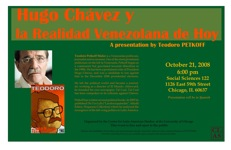 A talk by Teodoro Petkoff, prominent Venezuelan politician, journalist and economist. From the Center for Latin American Studies.
A talk by Teodoro Petkoff, prominent Venezuelan politician, journalist and economist. From the Center for Latin American Studies.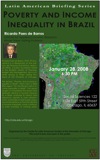 A presentation by Ricardo Paes de Barros, University of Chicago Tinker Visiting Professor, and Researcher at the Instituto de Pesquisa Econômica Aplicada (IPEA), a public foundation linked to the Brazilian Ministry of Planning, Budget and Management. This lecture stems from a 2006 IPEA report on the "Recent Fall in Income Inequality in Brazil". This report sought to consolidate the recent and dramatic decline in income inequality in Brazil, evaluate its impact and relevance, identify its main determinants, and finally to draft public policy recommendations so that the decline in income inequality could continue, or even increase, in coming years. Sponsored by the Center for Latin American Studies.
A presentation by Ricardo Paes de Barros, University of Chicago Tinker Visiting Professor, and Researcher at the Instituto de Pesquisa Econômica Aplicada (IPEA), a public foundation linked to the Brazilian Ministry of Planning, Budget and Management. This lecture stems from a 2006 IPEA report on the "Recent Fall in Income Inequality in Brazil". This report sought to consolidate the recent and dramatic decline in income inequality in Brazil, evaluate its impact and relevance, identify its main determinants, and finally to draft public policy recommendations so that the decline in income inequality could continue, or even increase, in coming years. Sponsored by the Center for Latin American Studies.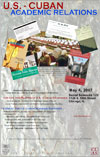 Introduction: Alan Kolata, University of Chicago. Discussants: Stephan Palmie, University of Chicago; Agnes Lugo-Ortiz, University of Chicago; Shannon Dawdy, University of Chicago; Laurie Frederik, University of Chicago; Paul Ryer, University of Chicago.
Introduction: Alan Kolata, University of Chicago. Discussants: Stephan Palmie, University of Chicago; Agnes Lugo-Ortiz, University of Chicago; Shannon Dawdy, University of Chicago; Laurie Frederik, University of Chicago; Paul Ryer, University of Chicago. Wayne Smith, Center for International Policy and Louis Pérez, University of North Carolina-Chapel Hill.
Wayne Smith, Center for International Policy and Louis Pérez, University of North Carolina-Chapel Hill.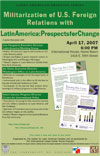 A panel discussion with: Lisa Haugaard, Executive Director of the Latin America Working Group; Joy Olson, Executive Director of the Washington Office on Latin America; Adam Isacson, Senior Associate at the Center for International Policy. From the Latin American Briefing Series. Co-sponsored by the Center for Latin American Studies and the International House Global Voices Program.
A panel discussion with: Lisa Haugaard, Executive Director of the Latin America Working Group; Joy Olson, Executive Director of the Washington Office on Latin America; Adam Isacson, Senior Associate at the Center for International Policy. From the Latin American Briefing Series. Co-sponsored by the Center for Latin American Studies and the International House Global Voices Program.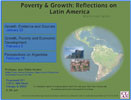 A three-part workshop with Professor Juan Pablo Nicolini, Winter Tinker Visiting Professor, Universidad Torcuato Di Tella. Sponsored by the Center for Latin American Studies
A three-part workshop with Professor Juan Pablo Nicolini, Winter Tinker Visiting Professor, Universidad Torcuato Di Tella. Sponsored by the Center for Latin American Studies A three-part workshop with Professor Juan Pablo Nicolini, Winter Tinker Visiting Professor, Universidad Torcuato Di Tella. Sponsored by the Center for Latin American Studies
A three-part workshop with Professor Juan Pablo Nicolini, Winter Tinker Visiting Professor, Universidad Torcuato Di Tella. Sponsored by the Center for Latin American Studies A three-part workshop with Professor Juan Pablo Nicolini, Winter Tinker Visiting Professor, Universidad Torcuato Di Tella. Sponsored by the Center for Latin American Studies
A three-part workshop with Professor Juan Pablo Nicolini, Winter Tinker Visiting Professor, Universidad Torcuato Di Tella. Sponsored by the Center for Latin American Studies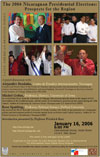 A panel discussion with: Alejandro Bendaña, Centro de Estudios Internacionales, Nicaragua; Michel Gobat, Professor, History, Iowa University; and Rose Spalding, Professor, Political Science, DePaul University From the Center for Latin American Studies' Latin American Briefing Series.
A panel discussion with: Alejandro Bendaña, Centro de Estudios Internacionales, Nicaragua; Michel Gobat, Professor, History, Iowa University; and Rose Spalding, Professor, Political Science, DePaul University From the Center for Latin American Studies' Latin American Briefing Series.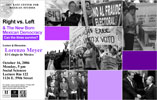 A lecture by Lorenzo Meyer, El Colegio de Mexico.
Sponsored by the Katz Center for Mexican Studies, the Center for Latin American Studies Latin American Briefing Series, the Hispanic Scholarship Fund, and Movimiento Estudiantil Chicano de Aztlan.
A lecture by Lorenzo Meyer, El Colegio de Mexico.
Sponsored by the Katz Center for Mexican Studies, the Center for Latin American Studies Latin American Briefing Series, the Hispanic Scholarship Fund, and Movimiento Estudiantil Chicano de Aztlan.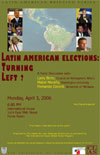 A panel discussion with: Larry Birns (Council on Hemispheric Affairs), Fernando Coronil (University of Michigan) and Mabel Moraña (Washington University); from the Latin American Briefing Series of the Center for Latin American Studies (http://clas.uchicago.edu).
A panel discussion with: Larry Birns (Council on Hemispheric Affairs), Fernando Coronil (University of Michigan) and Mabel Moraña (Washington University); from the Latin American Briefing Series of the Center for Latin American Studies (http://clas.uchicago.edu).